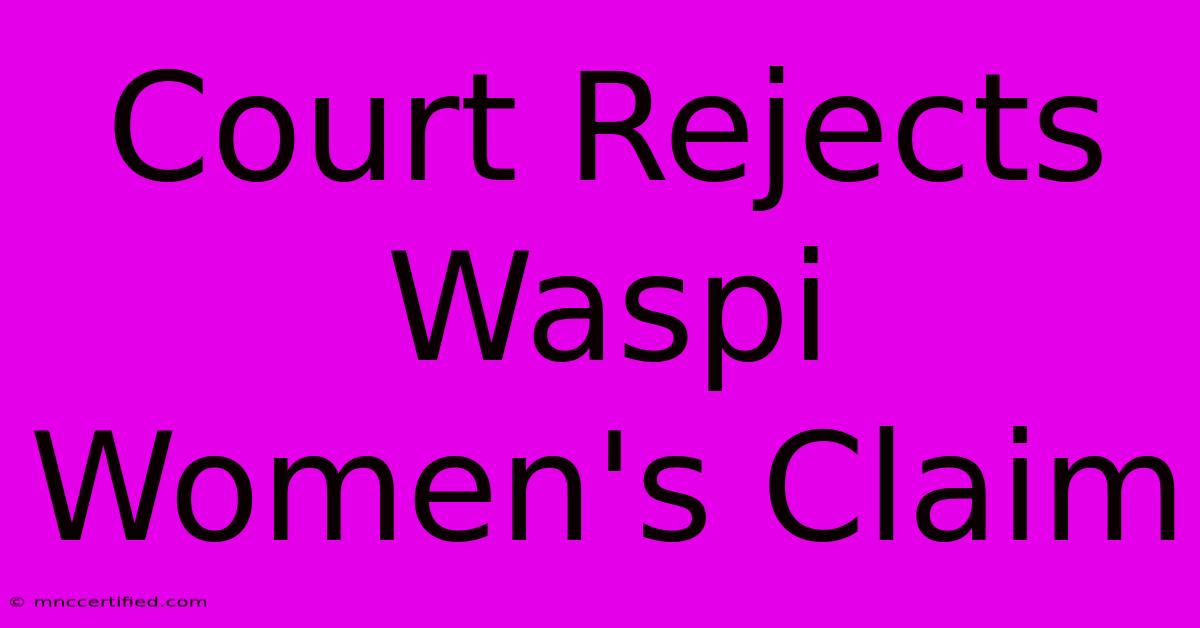Court Rejects Waspi Women's Claim

Table of Contents
Court Rejects WASPI Women's Claim: What Happens Now?
The High Court's rejection of the WASPI (Women Against State Pension Inequality) women's claim has sent shockwaves across the UK. This landmark ruling impacts hundreds of thousands of women who experienced a significant increase in their state pension age without what they considered adequate notice. This article delves into the details of the court's decision, explores its implications, and examines the potential next steps for affected women.
Understanding the WASPI Women's Case
The core argument of the WASPI women centered on the alleged inadequacy of government communication regarding changes to the state pension age. They argued that the government failed to provide sufficient notice of the accelerated changes, leading to significant financial hardship and impacting their retirement planning. Many women claim they were unaware of the changes, leading to substantial losses and disruptions. The case highlighted the complexities of government communication and its impact on vulnerable populations.
Key Arguments Presented by WASPI
The legal challenge brought by WASPI focused on several key arguments:
- Breach of Human Rights: WASPI argued that the changes to the state pension age violated their human rights, specifically the right to a fair hearing and the right to non-discrimination under the European Convention on Human Rights.
- Procedural Impropriety: The claim further alleged procedural impropriety, suggesting that the government failed to follow proper procedures when implementing the changes. This included concerns about insufficient public consultation and inadequate communication strategies.
- Promissory Estoppel: This legal principle suggests that a promise made by the government, even if not legally binding, should be upheld in certain circumstances. WASPI argued that previous government statements created a legitimate expectation of a different retirement age.
The High Court's Decision: A Setback for WASPI Women
Despite the compelling arguments presented, the High Court ultimately rejected the WASPI women's claim. The judges found that the government had acted lawfully and within its powers in changing the state pension age. They ruled that while the communication surrounding the changes could have been improved, it didn't reach the threshold of a breach of human rights or procedural impropriety. The court emphasized the government's right to make policy changes and adjust the state pension age to ensure the long-term sustainability of the system.
Implications of the High Court Ruling
The ruling has significant implications for the hundreds of thousands of women affected by the state pension age changes. It represents a legal setback for their campaign and raises questions about the future of their fight for compensation. Many women now face the difficult reality of adjusting to retirement on a reduced income, having planned for a different retirement age based on previous government guidance.
What Happens Next for WASPI Women?
While the High Court's decision is a significant blow, it doesn't necessarily mark the end of the WASPI women's fight. Several options remain open:
- Appeal to the Supreme Court: WASPI representatives have indicated the possibility of appealing the High Court's decision to the Supreme Court. This would involve a lengthy and complex legal process, with no guarantee of a different outcome.
- Continued Political Pressure: The WASPI campaign continues to exert significant political pressure, lobbying MPs and pushing for legislative changes to address the concerns of affected women.
- Seeking Alternative Support: WASPI women can explore various avenues for financial support, including seeking advice from pension advisors, applying for other government benefits, and accessing charitable organizations.
The Importance of Government Transparency and Communication
The WASPI case highlights the critical importance of clear, consistent, and timely communication from the government on policy changes that affect individuals' lives. The government's communication strategy regarding the state pension age changes is a subject of ongoing debate. The case serves as a stark reminder of the potential consequences when government communication falls short of expectations and negatively impacts citizens.
Keywords: WASPI, WASPI women, state pension age, state pension, court ruling, High Court, legal challenge, retirement, pension inequality, government communication, human rights, procedural impropriety, promissory estoppel, compensation, appeal, Supreme Court, financial hardship.
Note: This article provides information and analysis on the WASPI case. It is not intended as legal advice. Individuals seeking legal advice should consult with a qualified legal professional.

Thank you for visiting our website wich cover about Court Rejects Waspi Women's Claim. We hope the information provided has been useful to you. Feel free to contact us if you have any questions or need further assistance. See you next time and dont miss to bookmark.
Featured Posts
-
Scotlands 60mph Wind Warning
Dec 18, 2024
-
Gale Warning West Coast Yellow Alert
Dec 18, 2024
-
Dj Jordan North Rnli Heroes
Dec 18, 2024
-
Pakistan Beats South Africa By 3
Dec 18, 2024
-
1st Odi South Africa Vs Pakistan Live
Dec 18, 2024